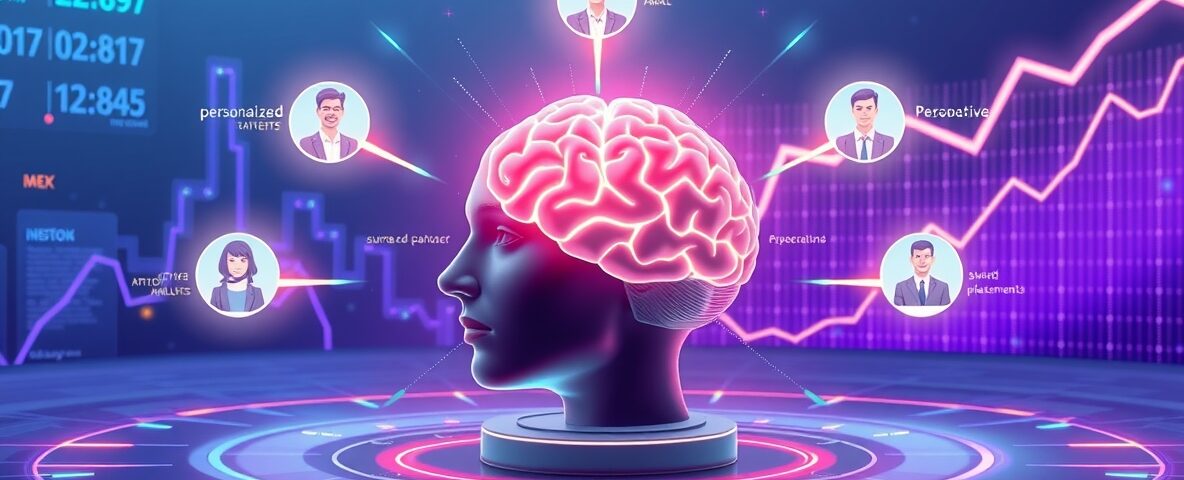
Unlocking Business Growth with the Power of AI Marketing Tools
September 17, 2025
AI is Redefining Marketing: Adapt Now or Fall Behind
September 17, 2025AI marketing, also known as AI-powered marketing or AI-driven marketing, refers to the use of artificial intelligence and machine learning algorithms to optimize and automate various marketing processes. These processes encompass data analysis, customer segmentation, content personalization, ad targeting, and more. AI marketing enables businesses to leverage data-driven insights to make informed decisions and execute targeted campaigns that resonate with their audience.
The Evolution of AI in Marketing
The concept of AI in marketing has evolved significantly over the years. Initially, marketing strategies relied on broad-based approaches with limited personalization. However, with the advent of AI, marketers gained access to vast amounts of data, enabling them to better understand customer preferences and behavior.
The first phase of AI in marketing involved using data analytics to study customer patterns and identify opportunities for improvement. As technology advanced, AI algorithms became more sophisticated, leading to the emergence of predictive analytics, chatbots, and AI-generated content.
Benefits of AI Marketing for Businesses
AI marketing offers many advantages for businesses looking to enhance their marketing efforts. Some key benefits include:
- Improved Customer Insights: AI-driven data analysis provides valuable insights into customer behavior, allowing businesses to understand their audience better.
- Enhanced Personalization: By tailoring content and marketing messages to individual preferences, AI enables personalized customer experiences, increasing engagement and loyalty.Efficient Campaign Optimization: AI’s ability to process large datasets quickly allows for real-time campaign optimization, resulting in improved ROI and reduced costs.
- Automated Customer Support: AI-powered chatbots efficiently handle customer queries, providing 24/7 support and freeing human resources for more complex tasks.
Increased Efficiency and Productivity: AI automates repetitive tasks, giving marketers more time to focus on creativity and strategy.

Strategy 1: Personalization at Scale: Tailoring Customer Experiences
Personalization has become the cornerstone of modern marketing strategies. Customers now expect personalized experiences that cater to their unique preferences and needs. AI marketing takes personalization to a whole new level, enabling businesses to deliver tailored content and recommendations at scale.
Understanding Customer Behavior with AI
AI’s ability to analyze vast amounts of customer data allows businesses to gain deep insights into customer preferences, purchase history, and browsing behavior. This data forms the foundation for creating personalized marketing campaigns. By understanding their customers better, businesses can deliver relevant content and product recommendations that resonate with each individual.
AI-Driven Content Personalization
Content personalization is a game-changer in the marketing world. With AI-driven content personalization, businesses can deliver dynamic content that adapts in real time based on the user’s behavior. This approach goes beyond traditional segmentation and allows individualized content recommendations tailored to each user’s preferences.
Consider a scenario where an e-commerce website utilizes AI to personalize the shopping experience. When a user visits the website, the AI system analyzes the user’s previous purchases, browsing history, and demographic information. Based on this data, the website’s homepage dynamically showcases products and promotions that align with the user’s interests and preferences. The AI system updates the content as the user navigates through the website to ensure a personalized experience.
Dynamic Email Marketing with AI
Email marketing remains a powerful tool for customer engagement, but generic email blasts often must be revised. AI-powered email marketing, on the other hand, can significantly boost open rates and conversions. By leveraging AI algorithms, businesses can send hyper-personalized email campaigns based on each recipient’s behavior and preferences.
For instance, an online clothing retailer can use AI to analyze customer interactions with previous emails and website behavior. If a customer frequently clicks on promotions for men’s clothing, the retailer can tailor future emails to focus on men’s fashion. This personalized approach enhances the chances of the recipient engaging with the email and making a purchase.
Real-Life Examples of Personalization in AI Marketing
- Netflix: The popular streaming service, Netflix, uses AI algorithms to recommend content to its users based on their viewing history. The “Recommended for You” section utilizes AI-driven content personalization to suggest movies and TV shows that align with each user’s taste.
- Amazon: The e-commerce giant, Amazon, is a pioneer in personalized product recommendations. Its AI-powered recommendation engine analyzes user behavior and purchase history to suggest relevant products, increasing the likelihood of conversion.
- Spotify: The music streaming platform, Spotify, uses AI to curate personalized playlists for its users. The “Discover Weekly” playlist is a prime example, as it recommends songs based on the user’s listening habits.
By incorporating AI-driven personalization strategies, these companies have significantly strengthened their customer relationships and boosted user engagement.

Strategy 2: Automating Customer Support with AI-Powered Chatbots
In the digital age, providing exceptional customer support is crucial for fostering brand loyalty and positive customer experiences. AI-powered chatbots have emerged as invaluable tools in automating customer support processes while maintaining a high level of service.
The Rise of AI-Powered Chatbots
Gone are the days of long wait times and frustrating customer service experiences. AI-powered chatbots offer instantaneous responses and can efficiently handle a wide range of customer queries. These chatbots are programmed with natural language processing (NLP) capabilities, allowing them to accurately understand and respond to human language.
Enhancing Customer Service with Chatbots
AI-powered chatbots are revolutionizing customer support by providing 24/7 assistance. They can handle common inquiries like order status, shipping information, and product details, allowing human agents to focus on more complex issues.
Additionally, chatbots can access vast information databases, ensuring they are equipped to address a wide array of customer queries. Their instant responsiveness and multitasking ability enable them to engage with multiple customers simultaneously, enhancing overall efficiency.
Crafting Engaging Conversations with Chatbots
Chatbots need to communicate conversationally to create a positive and engaging customer experience. Conversational AI is designed to mimic human conversation, making interactions with chatbots feel more natural and personalized.
Let’s consider an example of a chatbot employed by an online food delivery service. Instead of presenting a list of menu items, the chatbot engages the customer in a friendly conversation, asking about their dietary preferences and favorite cuisines. Based on the responses, the chatbot suggests personalized meal options, creating a more enjoyable and interactive experience for the customer.
Implementing Chatbots Across Platforms
AI-powered chatbots can be deployed across various platforms, including websites, social media, and messaging apps. By integrating chatbots into popular messaging apps like Facebook Messenger or WhatsApp, businesses can reach their customers where they already spend their time.
For instance, a travel agency could implement a chatbot on its website to assist customers with travel inquiries. Simultaneously, the agency could also offer the chatbot’s services on Facebook Messenger, allowing users to plan their trips and receive travel recommendations without leaving the app.

Strategy 3: Predictive Analytics: Anticipating Customer Needs
Understanding customer behavior and predicting their needs is essential to successful marketing strategies. Predictive analytics, powered by AI, enables businesses to anticipate customer preferences and deliver targeted offers and recommendations.
Harnessing Data for Predictive Insights
Predictive analytics relies on historical and real-time data to forecast future trends and behaviors. AI algorithms process vast datasets to identify patterns and correlations, including customer interactions, purchase history, and demographic information.
By analyzing this data, businesses gain valuable insights into customer preferences and pain points, allowing them to tailor their marketing efforts accordingly.
Anticipating Customer Behavior with AI
AI excels at recognizing patterns and predicting outcomes based on historical data. For instance, a retail company can use predictive analytics to determine which products will likely be popular during specific seasons or events. By understanding customer behavior, businesses can proactively prepare for increased demand, ensuring product availability and a seamless customer experience.
Improving Sales with AI-Driven Predictions
Predictive analytics not only aids in forecasting customer behavior but also helps optimize sales strategies. AI algorithms can identify potential high-value customers and recommend personalized offers to entice them to purchase.
For example, an online electronics store could use predictive analytics to identify customers interested in specific high-end products but have yet to purchase them. The store could then send targeted promotions or exclusive discounts to these customers, increasing the chances of converting leads into sales.
How Predictive Analytics Boosts Marketing Strategies
Predictive analytics has far-reaching implications for marketing strategies, including:
- Enhanced Customer Segmentation: By grouping customers based on shared characteristics and behavior, businesses can create targeted marketing campaigns for each segment.
- Optimized Content Strategy: Predictive analytics can identify the type of content that resonates most with different customer segments, guiding businesses in crafting compelling marketing materials.
- Improved Lead Scoring: AI-powered lead scoring helps prioritize potential customers based on their conversion likelihood, allowing sales teams to focus on high-quality leads.
- Reduced Churn and Customer Retention: Predictive analytics can identify customers at risk of churning, enabling businesses to implement retention strategies and foster long-term customer loyalty.
By leveraging AI-driven predictive analytics, businesses can stay one step ahead of the competition and deliver exceptional customer experiences.

Strategy 4: AI-Driven Content Creation and Curation
Content marketing is a cornerstone of modern digital strategies, and AI has begun to play a significant role in content creation and curation. However, integrating AI in content marketing raises essential questions about creativity, authenticity, and the future of human content creators.
AI-Generated Content: Boon or Bane?
AI-generated content has made substantial strides in recent years. From simple news articles to data-driven reports, AI algorithms can produce textual content that closely mimics human writing.
While AI-generated content offers unparalleled efficiency and speed, it raises concerns about authenticity and bias. Critics argue that AI cannot infuse emotion and creativity into content, making it feel mechanical and detached.
Personalizing Content with AI Assistance
Rather than replacing human content creators, AI can be a valuable assistant to enhance their productivity. AI-powered content creation tools can assist writers in generating topic ideas, researching data, and even suggesting sentence structures.
For instance, a content creator working on a travel blog could use an AI tool to gather relevant information about a destination, such as famous landmarks, local cuisine, and travel tips. The writer can then use this data as a foundation to craft a compelling and informative article, adding their personal touch to the content.
AI-Driven Content Curation Tools
Content curation is gathering and organizing relevant content from various sources to share with a target audience. AI-driven content curation tools use machine learning algorithms to sift through a vast range, selecting pieces that align with specific themes or keywords.
These tools enable businesses to maintain an active online presence by consistently sharing valuable content without the need for exhaustive manual searches. By curating content that resonates with their audience, businesses can position themselves as industry thought leaders and nurture a loyal online community.
Balancing Creativity and Automation in Content
While AI can automate specific content creation and curation aspects, maintaining a balance between AI-driven automation and human creativity is vital. Businesses must strive to find the right mix that preserves the authenticity and emotion only human creators can infuse into their work.
Content created by humans often connects more deeply with readers, evoking emotions and sparking conversations. To maintain authenticity, businesses should use AI to enhance and complement human creativity rather than relying solely on automation.

Strategy 5: Optimizing Marketing Campaigns with AI
Marketing campaigns are the lifeblood of businesses, driving brand awareness, customer acquisition, and revenue generation. AI has revolutionized how marketing campaigns are planned, executed, and optimized, making them more efficient and targeted.
Enhancing Ad Targeting and Performance
AI-powered ad targeting takes digital advertising to new heights by identifying the most relevant audience for each ad campaign. By analyzing user behavior and preferences, AI algorithms can display ads to individuals more likely to engage with the content and take action.
For example, a fitness apparel brand could use AI to target fitness enthusiasts who frequently engage with health and fitness-related content online. The brand’s AI-powered ad campaign would display personalized ads showcasing its latest activewear collection to this audience, increasing the likelihood of conversion.
AI-Driven A/B Testing for Better Results
A/B testing is a common practice in marketing to compare the performance of two campaign variations and determine which one yields better results. With AI-driven A/B testing, businesses can rapidly test multiple variations simultaneously, allowing quicker decision-making and improved campaign performance.
AI algorithms can analyze data in real time, making it easier to identify the most effective elements of a campaign and optimize for better outcomes. As a result, businesses can refine their marketing strategies continually and achieve higher conversion rates.
AI in SEO: Improving Search Engine Rankings
Search engine optimization (SEO) is vital for businesses aiming to improve their online visibility and rank higher in search engine results. AI is crucial in SEO, helping companies to understand search intent and optimize their content accordingly.
AI-driven SEO tools can analyze search trends, identify relevant keywords, and assess competitors’ strategies. With this data, businesses can create content that aligns with user intent and search algorithms, improving search rankings and organic traffic.
Real-Time Analytics and Campaign Adjustments
Traditional marketing campaigns often rely on historical data for analysis and adjustments. In contrast, AI enables real-time analytics, allowing marketers to monitor campaign performance as it unfolds.
With real-time insights, marketers can swiftly adapt their strategies based on customer behavior and emerging trends. This agility enables businesses to stay relevant and capitalize on opportunities.

Ethical Considerations and Challenges of AI Marketing
Integrating AI in marketing brings forth ethical considerations and challenges that businesses must address to ensure responsible and customer-centric practices.
Ensuring Ethical AI Practices
As AI algorithms drive marketing decisions, it is crucial to ensure that these algorithms are free from bias and discrimination. Biased algorithms can perpetuate stereotypes and unfairly target specific demographic groups.
Businesses must invest in diverse and inclusive datasets to train AI models. Additionally, ongoing monitoring and auditing of AI systems are essential to identify and rectify any biases that may emerge over time.
Addressing Privacy and Security Concerns
AI marketing heavily relies on customer data for personalization and targeting. However, this also raises concerns about data privacy and security.
Businesses must be transparent about their data collection practices and obtain explicit customer consent to use their data for marketing purposes. Implementing robust security measures is critical to safeguard customer data from breaches and cyber threats.
The Human Touch in AI-Driven Marketing
While AI can enhance marketing strategies, the human touch remains irreplaceable in building authentic customer connections. Businesses should balance automation and human interaction to deliver exceptional customer experiences.
AI can streamline processes, but human creativity and empathy ultimately foster customer loyalty and trust. Companies should leverage AI to augment human efforts rather than replace them.
Striking the Right Balance: Man and Machine
The future of AI marketing lies in striking the right balance between AI-driven automation and human creativity. Businesses should focus on integrating AI to optimize efficiency and data-driven decision-making while valuing human insights and instincts.
By harnessing the power of AI responsibly and ethically, businesses can create meaningful and lasting customer relationships, propelling their growth and success in the digital age.
Embracing AI marketing is no longer a luxury but a necessity for businesses seeking to stay competitive in a dynamic and technology-driven world. The five strategies explored in this blog post demonstrate the immense potential of AI in elevating marketing efforts and maximizing customer engagement.
From personalized customer experiences to automated chatbots and predictive analytics, AI marketing presents many opportunities to enhance marketing campaigns and deliver exceptional value to customers. However, navigating the ethical considerations and ensuring responsible AI practices is essential to build a sustainable and customer-centric marketing strategy.
As AI continues to evolve and reshape the marketing landscape, businesses that embrace these innovative strategies and adapt to the changing digital landscape will undoubtedly be better equipped to boost their business to new heights.


